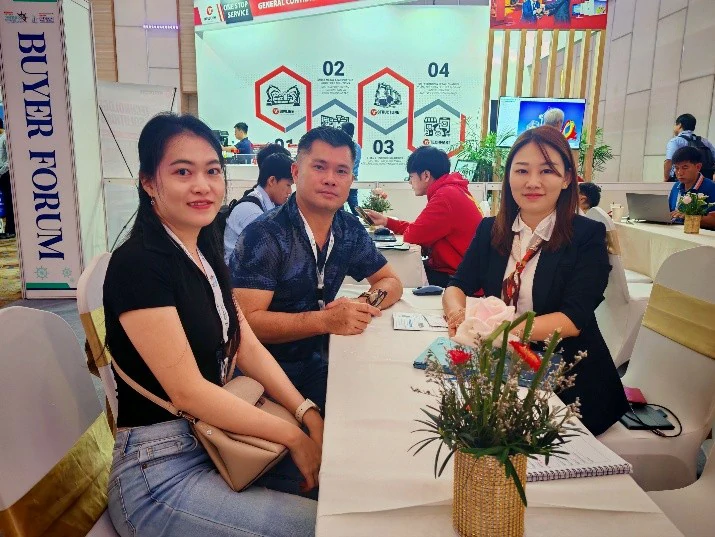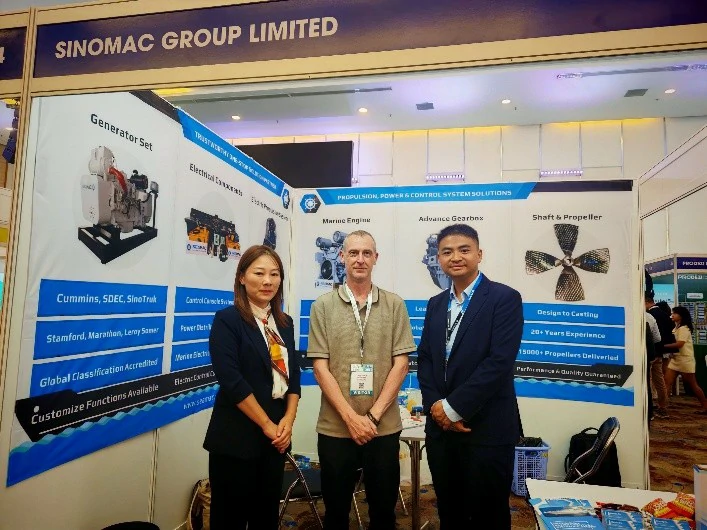Recently, the highly anticipated 2025 Vietnam International Maritime and Shipbuilding Exhibition concluded successfully at the Adora Convention Center in Ho Chi Minh City. As Vietnam’s largest and most specialized event in shipbuilding and maritime technology, the exhibition gathered top shipbuilders, maritime service providers, and marine equipment manufacturers from around the world. SeaMac actively participated, comprehensively showcasing its innovative achievements and integrated capabilities in ship solutions and high-efficiency propulsion systems. The company engaged in extensive and in-depth exchanges with industry partners, achieving fruitful outcomes from its participation.

Technology is the core essence of the exhibition, and innovation is the unchanging rhythm of development. As a subsidiary brand of SinoMac, SeaMac participated in this exhibition, dedicated to providing efficient and reliable one-stop supply chain solutions for global maritime industry partners. Throughout the three-day event, SeaMac’s booth drew significant attention from professional visitors. Through expert technical presentations and interactive experiences, we highlighted our marine electrical systems—including control consoles, power distribution, monitoring, and propulsion assistance—to clients, partners, and industry experts worldwide. At the same time, we showcased high-standard propeller product samples on-site—with intuitive process details and performance demonstrations, enabling customers to gain a more practical experience and in-depth understanding of our products.
This edition of the Vietnam International Maritime & Shipbuilding Exhibition, organized by Singapore’s Fireworks Exhibition Group, not only comprehensively showcased the latest technologies and development trends in shipbuilding, marine transportation, and offshore energy sectors, but also concurrently hosted the 2025 Vietnam Offshore Wind Energy Exhibition. This highlights the contemporary trend of deep integration between the maritime industry and clean energy. Hosted in Ho Chi Minh City—Vietnam’s largest port city and economic hub—the event provided an exceptional platform for international exchange and collaboration.

As a sub-brand of SinoMac, SeaMac, exhibiting at this event, specializes in providing efficient and reliable one-stop supply chain solutions for global maritime industry partners. Over the three-day exhibition, SeaMac’s booth attracted numerous professional visitors. Through expert technical presentations and interactive experiences, we highlighted our marine electrical systems—including control consoles, power distribution, monitoring, and propulsion assistance—to clients, partners, and industry experts worldwide. High-standard propeller products were also showcased on-site, offering visitors hands-on product demonstrations. Our innovative maritime solutions precisely address the market’s urgent demand for green, intelligent, and efficient shipping, earning high recognition and positive feedback from attendees


During the exhibition, the SeaMac team held multiple rounds of productive business discussions with numerous existing and new clients as well as potential partners, thoroughly exploring specific avenues for collaboration. This has laid a solid foundation for further expanding into the Vietnamese and Southeast Asian markets. Simultaneously, the team actively participated in industry forums and technical seminars, gaining precise insights into the latest trends in maritime technology evolution and market development. Through in-depth exchanges with global peers, the team accurately identified emerging developments in specialized areas such as environmental regulations (e.g., CII, EEXI), digital operations, and offshore wind power operation and maintenance vessels. This provided invaluable firsthand information and decision-making support for the company’s future product development and market strategy planning.


This participation in the Vietnam International Maritime Exhibition not only successfully elevated SinoMac’s brand recognition and influence within Southeast Asia’s maritime sector, but also served as a valuable journey for gaining industry insights and establishing resource connections. SinoMac will continue to uphold its core principle of keeping promises as good as gold, practicing the tenets of pragmatism and innovation. Keeping pace with the global maritime industry’s development, we will persist in providing customers with more advanced and reliable products and solutions. Together with industry partners, we will jointly advance the green, intelligent, and sustainable development of the shipping industry.
